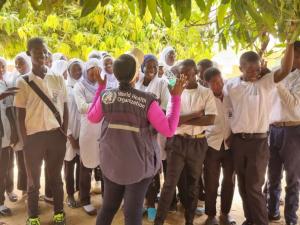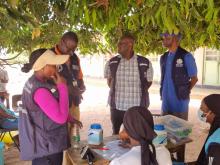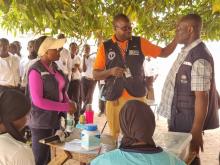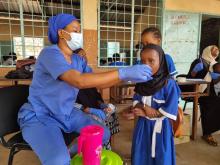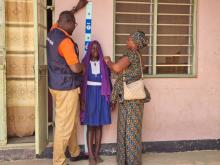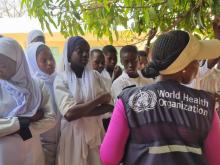WHO's MDA Campaign Makes Significant Strides Against Schistosomiasis in The Gambia
North Bank Region, The Gambia - The World Health Organization (WHO) has launched a transformative Mass Drug Administration (MDA) campaign to combat Schistosomiasis in The Gambia, with significant support from the Merck Praziquantel Donation Programme. This initiative is a critical step in addressing one of the most persistent Neglected Tropical Diseases affecting the country.
On Wednesday, Dr. Jane Maina, WHO Country Representative for The Gambia, visited the North Bank Region to observe the progress of public health officials actively engaged in the MDA campaign. The campaign is focused on the three highest-risk endemic districts in the region: Upper Badibou, Central Badibou, and Sabach Sanjal. Dr. Maina emphasized the importance of community participation in this health initiative, describing it as crucial for reducing the disease burden and protecting the community, particularly in the six most high-risk regions of the country.
"We also want to participate in the fight towards the elimination of schistosomiasis," Dr. Maina stated during her visit. She noted that the disease remains prevalent, especially among children aged 0-14 years and adults whose occupations expose them to contaminated water bodies. "Exposure occurs through drinking contaminated water and contact with water where these worms live," she explained.
Dr. Maina reassured the public of the effectiveness and safety of the medications being administered, highlighting that they have been proven "very effective" in treating schistosomiasis with "very minimal" side effects. These drugs, tested in other African countries, have shown significant efficacy and safety.
To this end, she appeals to communities to volunteer and participate fully in the ongoing MDA to eliminate this debilitating disease in the country.
Also speaking, Bala Jatta, Programme Manager for Neglected Tropical Diseases at the Ministry of Health, underscored the campaign's importance. She recalled the nationwide mapping conducted in 2015 to assess the schistosomiasis burden, which revealed a 4% endemicity rate. However, in the 27 districts currently targeted by the MDA, the endemicity rate exceeds 10%. This mapping justified the need for the MDA campaign to prevent further infections.
Lamin J. Jobarteh, Regional Principal Public Health Officer for North Bank East, highlighted the campaign's successes in the North Bank Region. He noted that schistosomiasis affects the health of both children and adults, driven by the movement of people and the availability of fresh water in the area. Jobarteh expressed optimism about the campaign's impact, aiming to reach 99,287 people in the three high-risk districts.
Schistosomiasis, an acute and chronic disease caused by parasitic worms, remains prevalent in tropical and subtropical regions, particularly in communities lacking safe drinking water and adequate sanitation. The WHO estimates that at least 90% of those needing treatment for schistosomiasis live in Africa. The goal of the ongoing MDA campaign is to reduce disease morbidity and transmission, working towards the elimination of schistosomiasis as a public health problem. Periodic treatment of at-risk populations can cure mild symptoms and prevent severe, late-stage chronic disease.
A significant challenge in schistosomiasis control has been the limited availability of praziquantel, especially for adult treatment. Praziquantel, the recommended treatment for all forms of schistosomiasis, is effective, safe, and low-cost. The Merck Praziquantel Donation Programme has been instrumental in providing these essential medications for the current campaign.
The ongoing MDA campaign represents a collaborative effort to address schistosomiasis and improve public health in The Gambia. With the support of WHO, Merck, and other partners, the country is making significant strides toward eliminating this debilitating disease.
